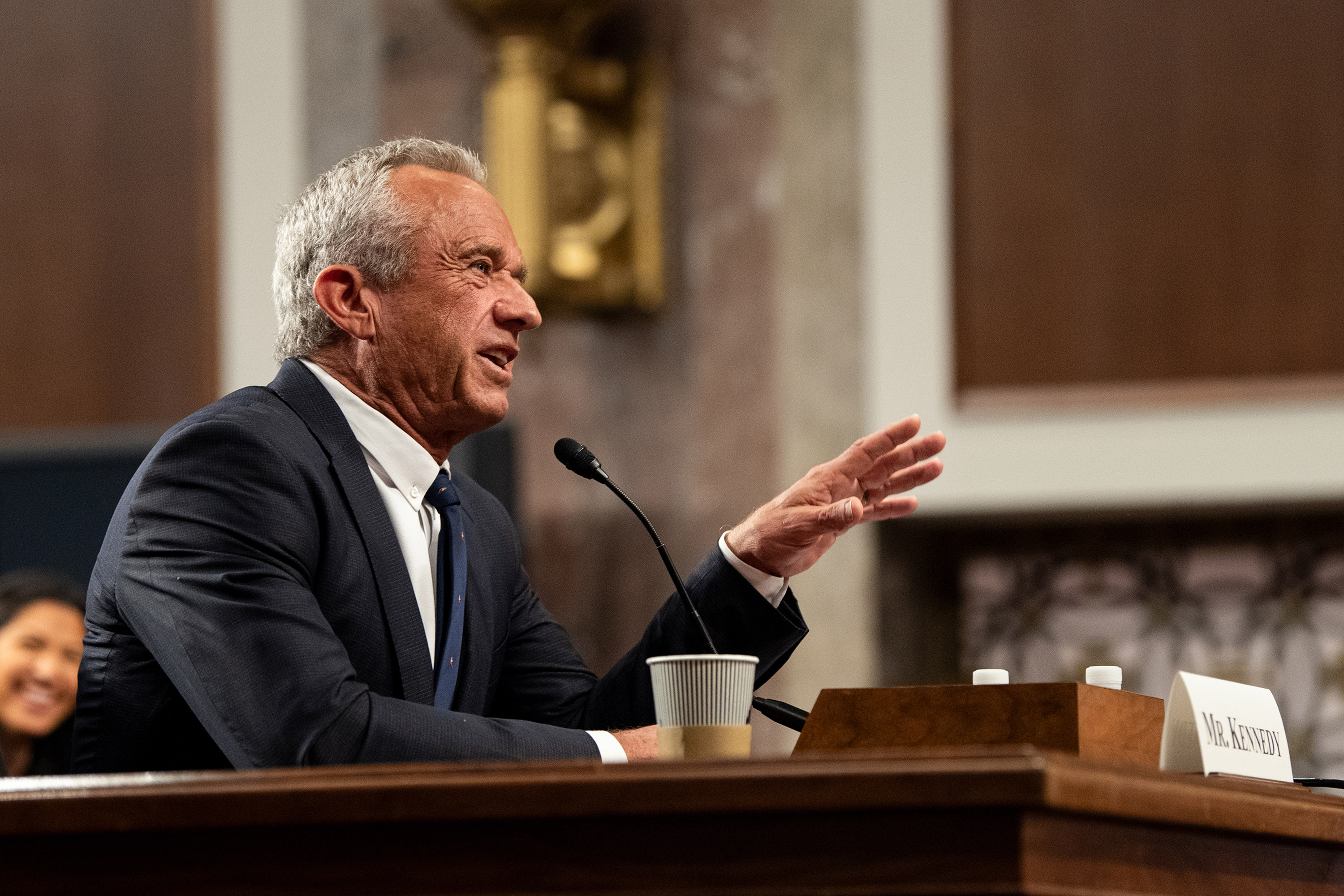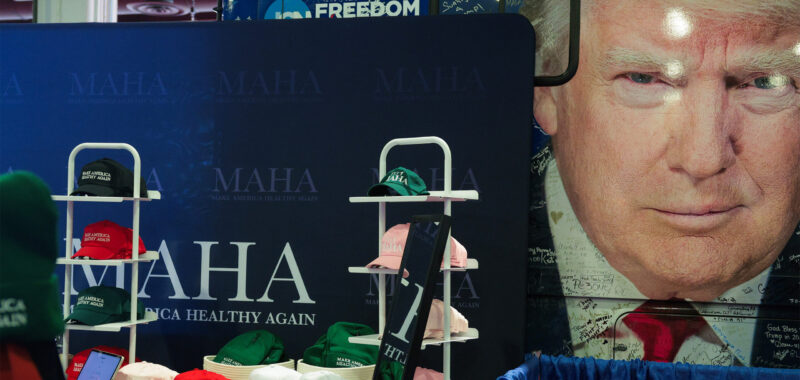After the Senate voted to confirm Robert F. Kennedy Jr. as Health and Human Services secretary, supporters of his “Make America Healthy Again” movement cheered at having a champion in the federal government.
Now the grumbling has begun. Some of Kennedy’s allies say he’s become almost inaccessible since his confirmation and complain that he’s made glacial progress advancing MAHA goals, such as halting mRNA-based covid shots and removing fluoride from drinking water.
The fractures underscore the clash between Kennedy’s movement and President Donald Trump’s “Make America Great Again” agenda. Kennedy is pulled between his supporters who want swift action to disrupt traditional health care and Trump, who is focused more on tariffs and increasing deportations than on disease, according to four people close to Kennedy who asked not to be identified because they weren’t authorized to speak to the press. Many of the priorities driving Kennedy’s MAHA program are not top priorities of his boss.
Kennedy’s capacity to navigate those tensions has been further strained by a measles outbreak and the threat of a bird flu pandemic, the people said.
Some of his deputies are still being vetted and other key positions remain unfilled. That, along with resignations of top HHS leaders and sweeping staffing reductions, has created a gap in expertise. Kennedy sometimes calls close informal advisers on the run before meetings, and the crises have put him in a reactionary stance, working on weekends and marshaling staff for Sunday meetings, according to the people.
More churn is coming because of an HHS reorganization set to eliminate about 20,000 jobs, including a 19% cut to the workforce at the FDA, which oversees food, nutrition, and vaccines.
HHS spokespeople didn’t respond to emails seeking comment.
To be sure, Kennedy’s ascendance represents a breakthrough for the MAHA movement, a broad collection of gadflies, groups, and wellness influencers who extol raw milk, metabolic health, and sustainable farming while lambasting Big Pharma, vaccines, and processed foods.
The coming months will test Kennedy’s ability to juggle the challenges and achieve Trump’s goals without losing the support of MAHA adherents, especially special interest and advocacy groups that helped him reach his influential perch overseeing one of the nation’s largest federal agencies. HHS, with a budget of almost $2 trillion, includes the Centers for Disease Control and Prevention, the National Institutes of Health, and the Centers for Medicare & Medicaid Services.
But the MAHA goals aren’t top agenda items for GOP voters, who tend to be focused more on the price of eggs than whether they’re organic.
The MAHA faithful “expect action” but their to-do list is not necessarily a high priority for voters or lawmakers, said Robert Blendon, a professor emeritus of health policy and political analysis at Harvard. “And should there be a big measles outbreak or avian flu, it would hurt the White House if there was a big conflict over vaccines going on,” he said.
An additional challenge for Kennedy is that not all MAHA and MAGA goals overlap. Trump wants to slash the workforce, which Kennedy has embraced. But fulfilling MAHA wishes will require more regulation, which runs counter to MAGA dogma favoring a smaller federal government.
MAHA wants fluoride out of water because followers say it leads to lower IQ levels in children, as well as arthritis and bone cancer. Kennedy said on X that fluoride is dangerous and that the Trump administration would recommend it be removed from America’s drinking water. Fluoridated water is credited for vastly reducing rates of tooth decay in the U.S. In 2015, the CDC called water fluoridation one of the 10 greatest public health achievements of the 20th century, and only 15% of Americans think fluoride is harmful or detrimental to the public, based on a poll in January by market research company Ipsos.
MAHA adherents believe in the debunked claim that vaccines cause autism, and Kennedy just tapped a vaccine opponent to work on a study on possible connections. In fact, HHS has launched an effort that Kennedy said will determine by September what has caused the “autism epidemic.” Many autism researchers say this timeline sows doubts about the study’s seriousness. Most voters support vaccines and believe in their benefits. Eight in 10 parents with children under age 18 say they normally keep them up to date with recommended childhood vaccines, according to a KFF poll in January.
And MAHA wants to replace seed oils, which the movement’s followers claim without evidence are unhealthy, with animal fats such as beef tallow, which is high in saturated fat, which can contribute to high cholesterol and heart disease. Only 13% of Americans believe seed oils are unhealthy to consume, based on a poll by the industry-backed International Food Information Council.
Perhaps no goal is more important to many MAHA followers, however, than banning the mRNA technology behind covid vaccines by Moderna and Pfizer.
“The big threat is that we still have covid-19 vaccines on the market,” said Peter McCullough, a former cardiologist who has been criticized for spreading covid misinformation and has informally advised Kennedy. “It’s horrendous. I would not hesitate; I would just pull it. What’s he waiting for?”
The FDA says covid shots are safe. They are credited for saving millions of lives worldwide during the pandemic, and two NIH-funded scientists who advanced mRNA technology were awarded the Nobel Prize in physiology or medicine in 2023.
Yanking authority for mRNA-based covid vaccines could backfire because Trump sees “Operation Warp Speed,” the federal effort to develop the shots, as one of his signature achievements, according to one of the people close to Kennedy. And it would have been impolitic to take action before the confirmation of an FDA commissioner, the person said. Marty Makary, a Johns Hopkins University researcher, was confirmed on March 25 to the post.
Kennedy also isn’t calling all the shots. He was initially unaware of the appointment of Gerald Parker, a veterinarian who recently chaired an NIH advisory board, to head the White House’s pandemic office, according to one of the people.
Kennedy did choose Susan Monarez, a former deputy director of the Advanced Research Projects Agency for Health, as acting CDC director. Trump nominated her for Senate confirmation to lead the agency on March 24. Kennedy felt she had worked well with Trump’s job-cutting Department of Government Efficiency and did a great job in her acting director position, one of the people close to him said.
Kennedy is also in a difficult position regarding Trump’s Make America Healthy Again commission, which Kennedy chairs. The panel’s charge to investigate and deliver an action plan on the nation’s decades-long increase in chronic illness, with a special emphasis on children, is a clear pitch to the MAHA movement. But Trump has told Kennedy, according to one of the people, that he wants to see measurable progress in a year to 18 months — which is hard both to define and to achieve.

While Kennedy is a scion of the country’s most famous Democratic family, he is widely distrusted in the medical community because of his fringe views on vaccines and his rejection of established science. Since taking office, he has tried to cultivate relationships with MAGA-leaning state officials, including West Virginia’s governor, Republican Patrick Morrisey. And his alliance with Trump is new. When Kennedy was running for president in 2024, Trump took to his Truth Social platform to say, “Kennedy is a Radical Left Democrat, and always will be!!!” — though Trump’s administration includes other onetime adversaries such as Secretary of State Marco Rubio.
Many of Kennedy’s nutrition and health goals would require regulation, which clash with Trump’s anti-regulatory agenda and his focus on a lean federal government.
Meanwhile, he’s relied on his principal deputy chief of staff, Stefanie Spear, a longtime Kennedy aide who has taken on the role of traffic cop in the department. He’s also leaned on HHS chief of staff Heather Flick Melanson for expertise. She was a senior adviser to former HHS Secretary Alex Azar in Trump’s first term.
Kennedy’s close circle of informal advisers includes nontraditional doctors, fellow vaccine opponents, media personalities, and self-appointed health gurus. Some have gained unprecedented influence and access to the innermost workings of federal health agencies.
Calley Means, for example, is a Kennedy ally whose business sells wellness products such as saunas and supplements. His statements have dismayed some scientists, such as when he called covid vaccine mandates for children a “war crime” and said without evidence that “metabolically healthy” people don’t die from covid. In March, Means joined the White House as a special government employee and MAHA adviser.
Others in Kennedy’s orbit include Del Bigtree, a television producer who founded the anti-vaccination group Informed Consent Action Network, and some officials from the previous Trump administration. Aaron Siri, a lawyer for Kennedy, is no longer involved in vetting candidates for HHS positions, one of the people said.
“‘Nontraditional’ as a description for these people is not enough. We’re talking about beyond the outer fringes of medicine,” said Irwin Redlener, senior adviser for the National Center for Disaster Preparedness at Columbia University, of Kennedy’s inner circle. “This faux expertise is really dangerous.”
Even as some MAHA adherents press for swifter action, Kennedy’s recent comments and actions suggest public health ideas once dismissed as fringe or unscientific now have an advocate at HHS.
Kennedy claimed without evidence that cod liver oil is an effective treatment for measles. He’s suggested letting the bird flu virus rip unchecked through infected chicken flocks even though scientists say that could unleash dangerous mutations.
And he’s backed cellphone bans in schools, saying phones cause cancer in kids. Most studies have found no such link.

